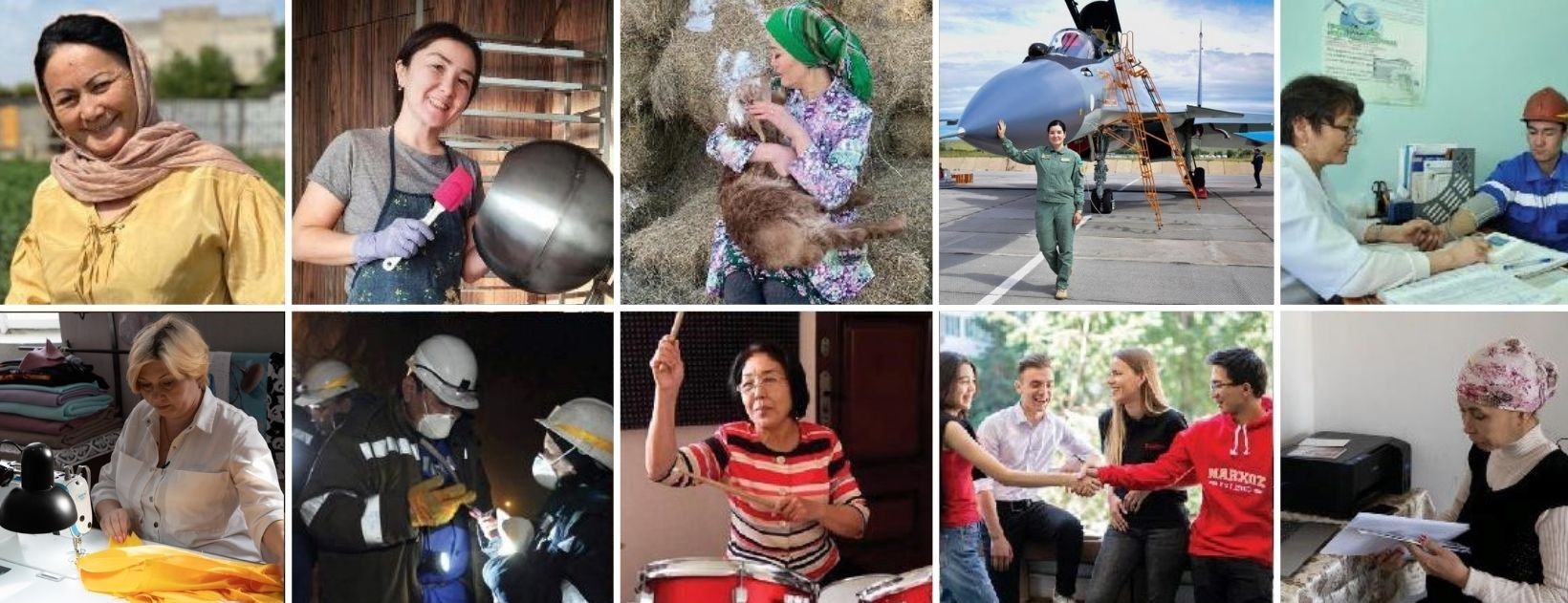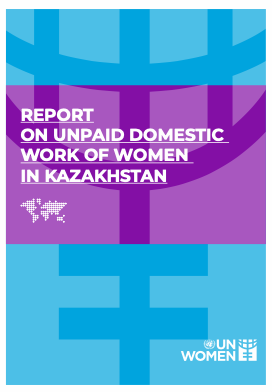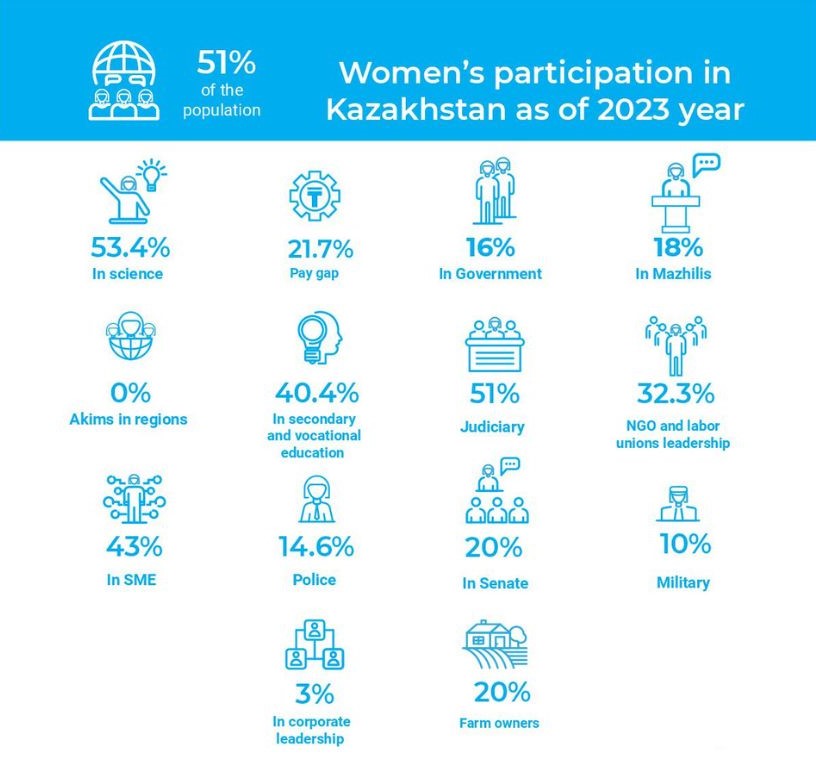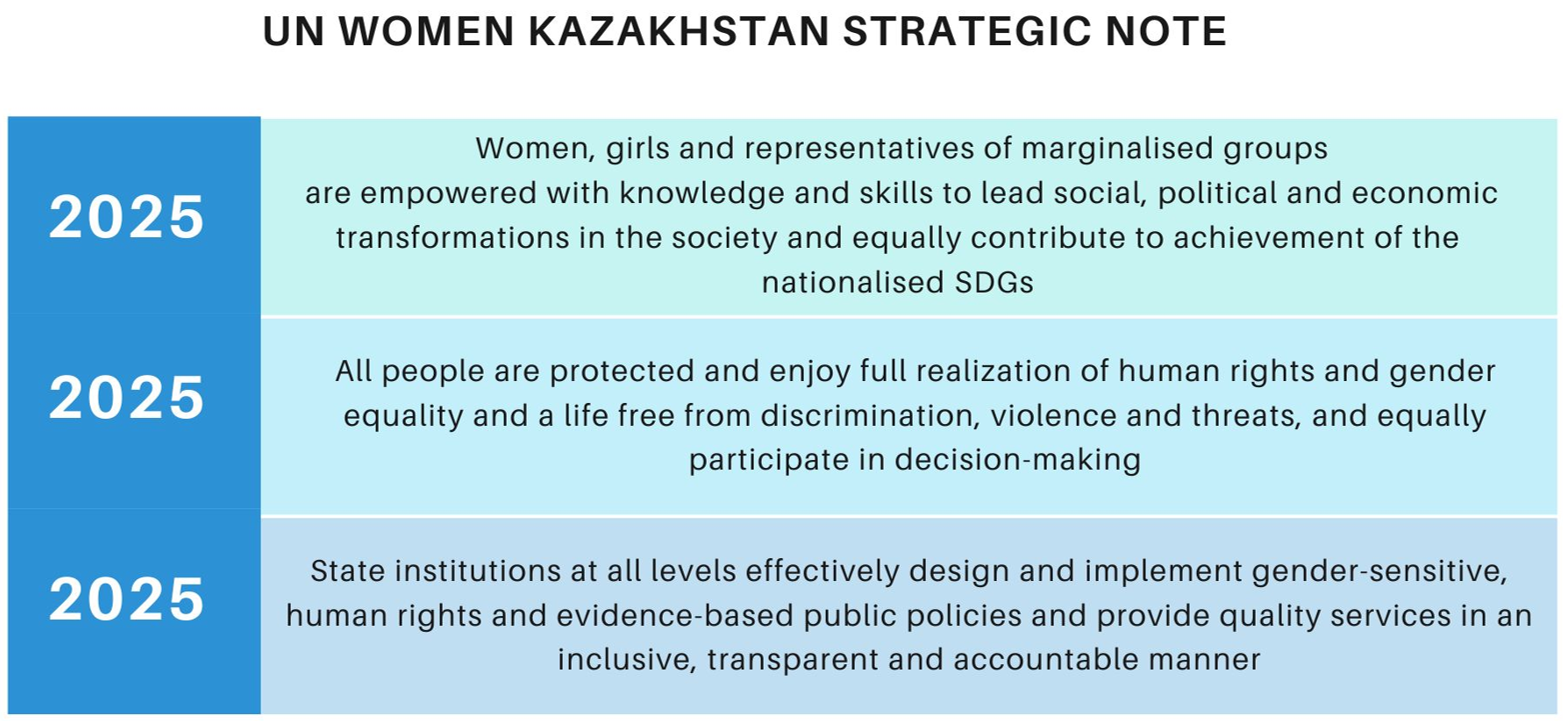


The Republic of Kazakhstan is the ninth largest country in the world, roughly the size of Western Europe. Kazakhstan is landlocked and has one of the lowest population densities with just over 20 million people. Kazakhstan is an upper-middle-income country with a per capita GDP of USD 13,088.5 (2023).
Among the countries of Central Asia, Kazakhstan is a leader in progress on gender equality, ranking 76th out of 146 countries in the Global Gender Gap Index 2024, a report designed to measure gender equality. The country has received the highest score in the "level of education" category and scored highly in the area of "survival and health". However, the report shows that progress is still insignificant in the areas of "political empowerment" and "economic participation and opportunity".
Kazakhstan ranks 67th among 193 countries in the 2023/2024 Human Development Report (UNDP) and 66th of 166 countries in the 2023 SDG Index, which assesses country performance on the UN Agenda 2030 and the Sustainable Development Goals.
State policy provides legislative support to women.
Kazakhstan was one of the first Central Asian countries to establish a national entity to promote gender equality (the National Commission on Women, Family and Demographic Policy). In addition, the Constitution of the Republic of Kazakhstan guarantees equality of rights and freedoms of all citizens and prohibits discrimination on the basis of gender. Its Gender Equality Strategy for 2006 - 2016 established measures to create and improve legislation in the interests of gender equality. The updated Concept of Family and Gender Policy until 2030 now includes plans to increase to 30 per cent by 2030 the share of women at decision-making levels in executive, representative and judicial authorities, state, quasi-state, and corporate sectors. The same policy sets steps to decrease domestic violence against women, improve the gender wage gap, and increase women’s ownership of assets.
Kazakhstan has ratified several international conventions, including the Beijing Declaration and Platform for Action (1995), the Convention on the Elimination of All Forms of Discrimination Against Women (CEDAW), the Convention on the Political Rights of Women (1999), the Convention on the Nationality of Married Woman (1999), and eight fundamental Conventions of the International Labour Organization (ILO), and the 2030 Agenda for Sustainable Development.
Kazakhstan adopted the first National Action Plan for the implementation of the UN Security Council resolution "Peace, Women and Security". Kazakh women today participate in global humanitarian operations as part of the UN peacekeeping forces. In 2021, Kazakhstan joined two Coalitions of Action of the Global Forum "Generation of Equality", committing to combat gender-based violence and ensure economic justice and rights. This led to the abolishment of the list of prohibited professions for women.
In 2024, a representative from Kazakhstan was elected to the CEDAW Committee, marking the first time a representative from Kazakhstan and Central Asia being elected to this vital UN body.
During the 76th session of the UN General Assembly in New York, the Republic of Kazakhstan was elected a member of the Human Rights Council (HRC) for 2022-2024, with the agenda of gender equality and women's empowerment.
Kazakhstan actively participates in the work of the UN Commission on the Status of Women, which reviews the implementation of international standards to protect and promote women's rights.
Nevertheless, persistent gender imbalances remain, particularly for wages and access to employment and career opportunities. In 2022, the gender wage gap was 25.2 per cent in favor of men.

On April 15, 2024, Kazakhstan adopted a law aimed at protecting the rights of women and safety of children. Norms have been introduced to toughen accountability for all acts of violence against women and children, strengthen the institution of the family, and enhance the safety of minors. Specifically, the intentional infliction of minor health harm and battery have now been criminalised. Additionally, the accountability for intentionally causing moderate to severe health damage has been increased.
Active in Kazakhstan since 1999, UN Women has worked with the Government and other national partners, civil society, educational institutions, the private sector, and the media to ensure equality and opportunities for women and girls.
UN Women has a triple mandate to:
UN Women in Kazakhstan supports national development and the country's fulfillment of international obligations to ensure gender equality, particularly in:
The strategic vision of UN Women in Kazakhstan for 2022 - 2025 guides its work with the government, other partners, and the UN Country Team to mobilize sustained action for gender equality and the empowerment of all women and girls, and support the 2030 Agenda for Sustainable Development.
The strategic goals of UN Women in Kazakhstan correspond with the UN Women global strategy and the UN country programme for sustainable development:

In addition, UN Women in Kazakhstan oversees the work of the UN Inter-agency Gender Thematic Group, conducts awareness-raising initiatives on gender equality, and collaborates with the private sector to expand women's economic opportunities.
For further information on UN Women's work in Kazakhstan, please review this brochure.
This study aims to explore how the state can help its citizens gain confidence in life when help is given to care for dependent family members, including children, seniors, and people with disabilities.

I am Generation Equality: Assemgul Temirkhanova, Kazakhstani golden grappling champion
Assemgul Temirkhanova, 37, is a national golden grappling champion in Kazakhstan challenging gender stereotypes in sports and beyond. Temirkhanova studied Librarian and Information Sciences in the USA, and for many years has been working as a leading librarian at Nazarbayev University in Nur-Sultan, Kazakhstan. Read more.
See more news from Kazakhstan here.